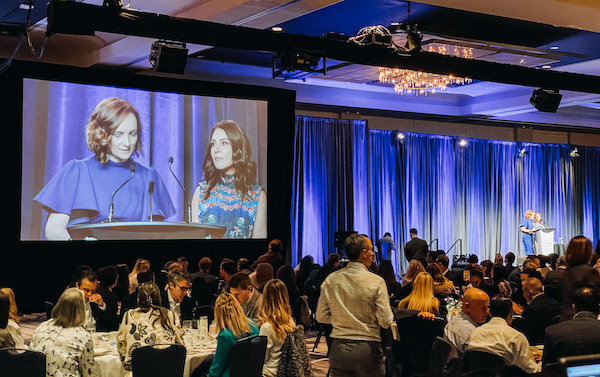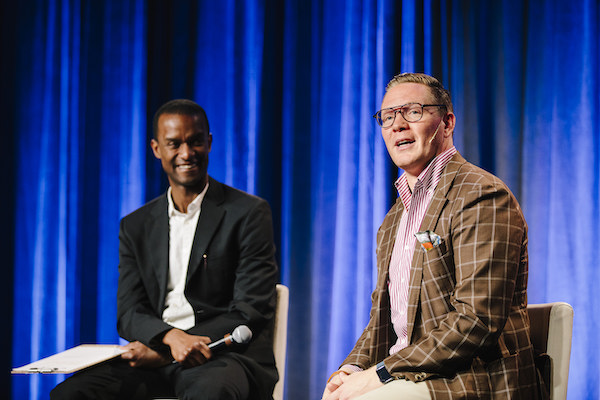Emcee Michael Newman, left, and keynote speaker Anders Sörman-Nilsson at the Jewish Family Services Innovators Lunch. (photo by Josh Bowie)
“I believe that the next trend is not necessarily digital transformation, but it is the alignment of two of these trends: sustainability and digitalization,” Swedish-Australian futurist Anders Sörman-Nilsson told guests at the 17th Annual Jewish Family Services Innovators Lunch on May 10. Organizations that align digital transformation and sustainability have a 2.5 times better chance of being top performers, he said.
Sörman-Nilsson was the keynote speaker at the lunch, which took place at the Hyatt Regency, the first in-person Innovators since the beginning of the pandemic.
As the founder of Thinque, a think tank and trend analysis firm that reaches global brands across four continents, Sörman-Nilsson is responsible for data-based research and foresight regarding future trends. Beyond his research, he is known for co-creating the Adobe Creative Intelligence test for B2B (business-to-business) marketing. He currently hosts two social innovation podcasts, the 2nd Renaissance Podcast and Entrepreneurs Organization’s Scaling Impact Podcast, and is the author of three books, Aftershock (2020), Seamless (2017) and Digilogue (2013). Sörman-Nilsson’s approach to futurism involves seeking out what he calls “avant-garde ideas” that can drive meaningful change.
Sörman-Nilsson aims to challenge the misconception that integrating technology into an organization’s operations impedes human connection. He gave the example of his family’s business, a clothing store, which thrived on personal interaction out of a brick-and-mortar building in a “highly analogue fashion,” using a pen and paper. He said such an approach is suited “for a world that no longer exists” and that the eventual bankruptcy of the store after 104 years of business was due to the failure to adopt new technologies. He dedicated Digilogue to his parents, exploring in it “how to win the digital minds and analogue hearts of tomorrow’s customers.” He emphasized that technological tools and personable business principles can not only coexist, but enhance one another.
Sörman-Nilsson urged businesses to conduct “pre-mortem” analyses to identify changes that could prevent obsolescence or bankruptcy. He asked people to imagine that it is 2030 and your company has gone under – what were the trends you missed, what were the signs you ignored and what were the investment decisions you delayed that contributed to your company’s failure? To avoid such an outcome, he encouraged organizations to focus on “mega trends” based on the United Nations Sustainable Development Goals, such as prioritizing affordable and clean energy, responsible consumption, and improving global health and well-being. These goals are “a good indicator of where the world and smart capital is moving,” he said, and reflecting one or more of them in the product or service you provide and in your day-to-day operations and external marketing efforts is key for long-term success. “Mega trends are powerful,” he said, “but they’re particularly exponential when you sit at the intersection of two overarching aligning trends, like digitalization and sustainability.”
Sörman-Nilsson uses the UN Brundtland Commission definition of sustainability, which he described as “meeting the needs of the present without hindering future generations from meeting theirs.” He spoke about the concept of “conscious capitalism,” where an organization is purpose-driven and prioritizes stakeholder well-being. Building a sustainable “ecosystem of impact” – otherwise known as a supply chain – is crucial in winning over today’s consumers, he argued, adding that technology is the most efficient way to achieve this. Better data collection, for example, can lead to less waste, or to gauging more accurately consumer needs. In his Innovators Lunch talk, he compared such technological integration to tikkun olam, as it reflects one’s responsibility to repair the world. He also advocated for the practice of “effective altruism,” which, he said, means that “the investment of your dollar in philanthropy should go the furthest,” giving the example of investing in mosquito nets in Africa. He connected this idea – helping the most people as possible – to tzedakah, justice and charity, as well as to tikkun olam.
Sörman-Nilsson reminded the audience that major tech players are raising the bar with predictive technologies that have the power to solve problems before they arise. He challenged businesses to use technology to streamline mundane tasks, which would allow workers to focus on more meaningful and humanistic responsibilities. He emphasized the importance of merging humanism and technology to leverage the best of human intelligence and artificial intelligence. He stressed the need to “ask the right questions” and incorporate human creativity and ethical decision-making when engaging with technological tools. By doing so, he said, brands can enhance their ability to cultivate community.
Headlining this year’s JFS Innovators Lunch, Sörman-Nilsson shared his insights with more than 500 guests. Over the past 16 years, the Innovator’s Lunch has raised more than $5 million for JFS, supporting services such as food, counseling, housing and comprehensive care for children, youth, adults and seniors. Event committee chair Candice Thal said, “I believe that giving back to the community is not only a responsibility but a privilege.” This event, she said, is “our way of caring for others,” the funds raised helping JFS provide services for more than 3,000 community members.

The event was emceed by Michael Newman of Global BC News. Following a land acknowledgement from Elder Rose Guerin of the Musqueam First Nation and welcoming remarks from Thal and Tanja Demajo, chief executive officer of JFS, there was a video entitled Building Future, Today, which showcased how JFS not only helps individuals, but their families, creating a ripple effect on the entire community and future generations. Rabbi Dan Moskovitz of Temple Sholom, who did the blessing over the meal, underscored JFS’s mission with the story of “Sam,” a man who sought the rabbi’s help after falling on hard times. “We know many people like Sam,” said Moskovitz. While change is constant, he said, some things never change: “People still get sick, they are hungry, inadequately housed, lonely and vulnerable.” He concluded, “The work of JFS, your support of Jewish Family Services, has never been more important or more necessary.”
Moskovitz’s sentiment was shared by Jody Dales, chair of the JFS board of directors, who shared how the Jewish community helped her after she tried to take her own life when she was 19 years old, living on her own and barely making ends meet at a minimum-wage job. “The blade didn’t cut deep enough to do any real damage but it penetrated enough to scare the hell out of me,” she said. “In the darkest moment of my life, the faintest ray of hope appeared, and I called my mom. And because she was part of the community, thiscommunity, her well-placed phone call set off a chain of events that tracked me into the office of a professional who saved my life. It took me years to ask for help, only days to receive it, but a lifetime to heal.”
In a very different place today, Dales said she shared her story so that people could “understand the complexities of despair, dread and depression. I doubt that there’s a person in this room for whom at least parts of this conversation don’t resonate.”
Among the tools that continue to help her, she said, “is dedicating my life to a life of service. It’s hard to feel bad about yourself when you’re making other people feel good about themselves. And there’s no agency that I know of that makes people feel good about themselves better than Jewish Family Services.”
For Dales, JFS can make such an impact because of the “intangibles” they offer – making all people feel seen and valued. “JFS is overwhelmed with need,” she said, and the only thing holding the organization back from helping more is money. She highlighted the event’s gift-matching sponsor, the Paul and Edwina Heller Memorial Fund, and encouraged people to donate. To do so, visit jfsinnovators.ca/donate.
Alisa Bressler is a fourth-year student at Queen’s University in Kingston, Ont. She is an avid reader and writer, and the online director of the arts and culture publication MUSE Magazine. Bressler is a member of the Vancouver Jewish community, and the inaugural Baila Lazarus Jewish Journalism Intern.

